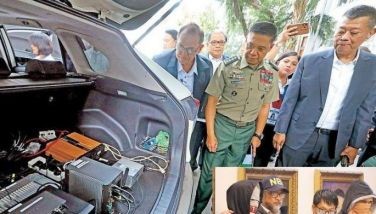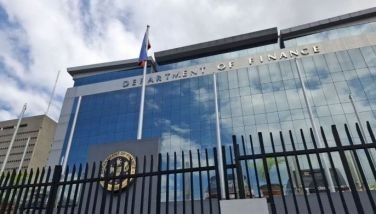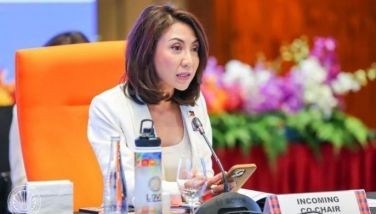Pre-campaign ads at P6.7B: Bribery, tax evasion, impunity?
MANILA, Philippines (Philippine Center for Investigative Journalism) - To the last, they sing the same song: They hate corruption. They love the poor. They mean well. They are true. They are good. They are pure.
Or at least that is what they say or claim in their political ads.
The same narrative almost defines the campaign of the top candidates for both national and local posts in the May 2016 elections. But more than desire or ambition to rule the nation and control the public purse, a few other things unite them, too.
For at least four of the five candidates for president, five for vice president, 22 for senator, six party-list groups, and 17 candidates for local positions, trying to get themselves elected has meant spending like crazy on political ads.
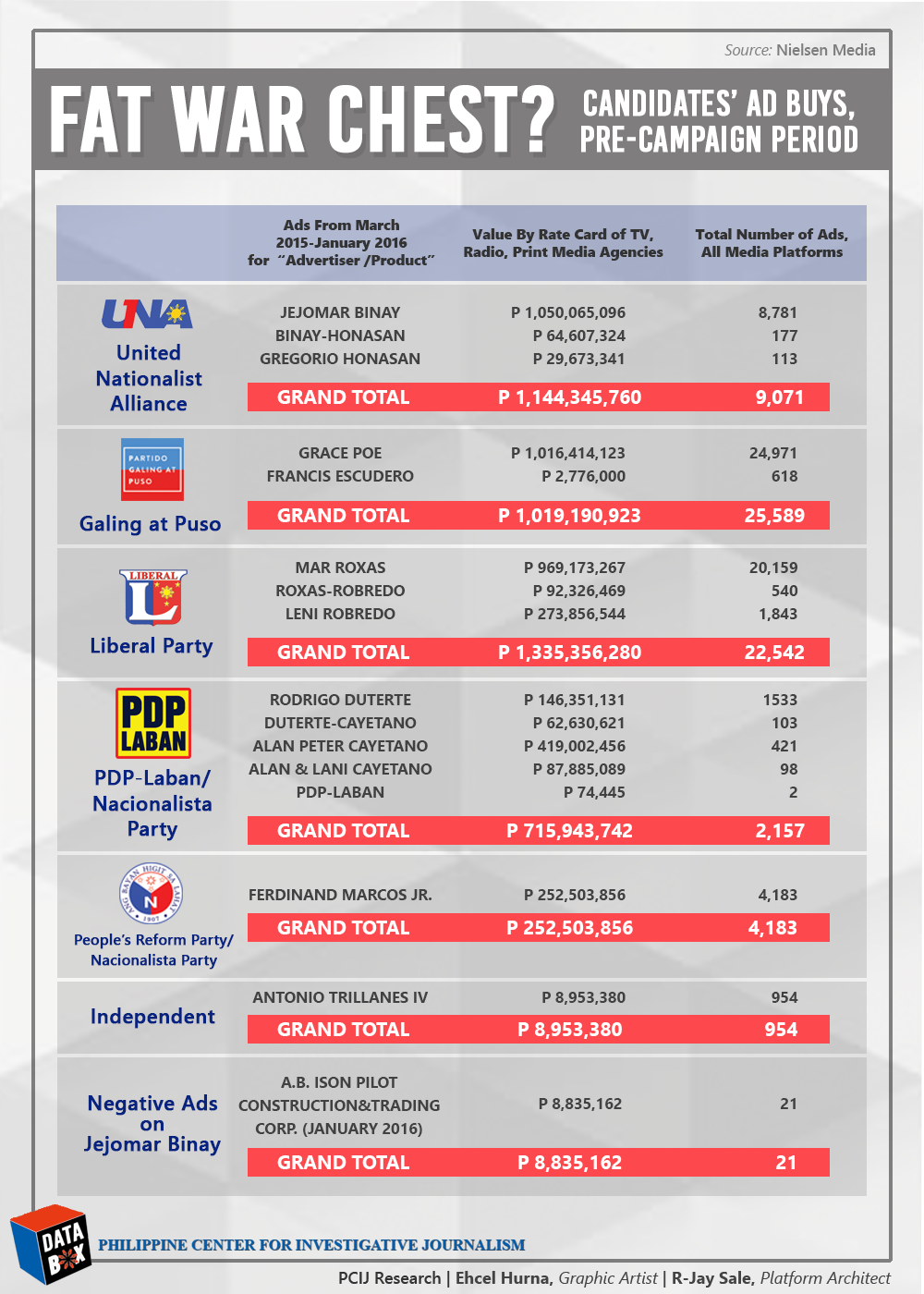
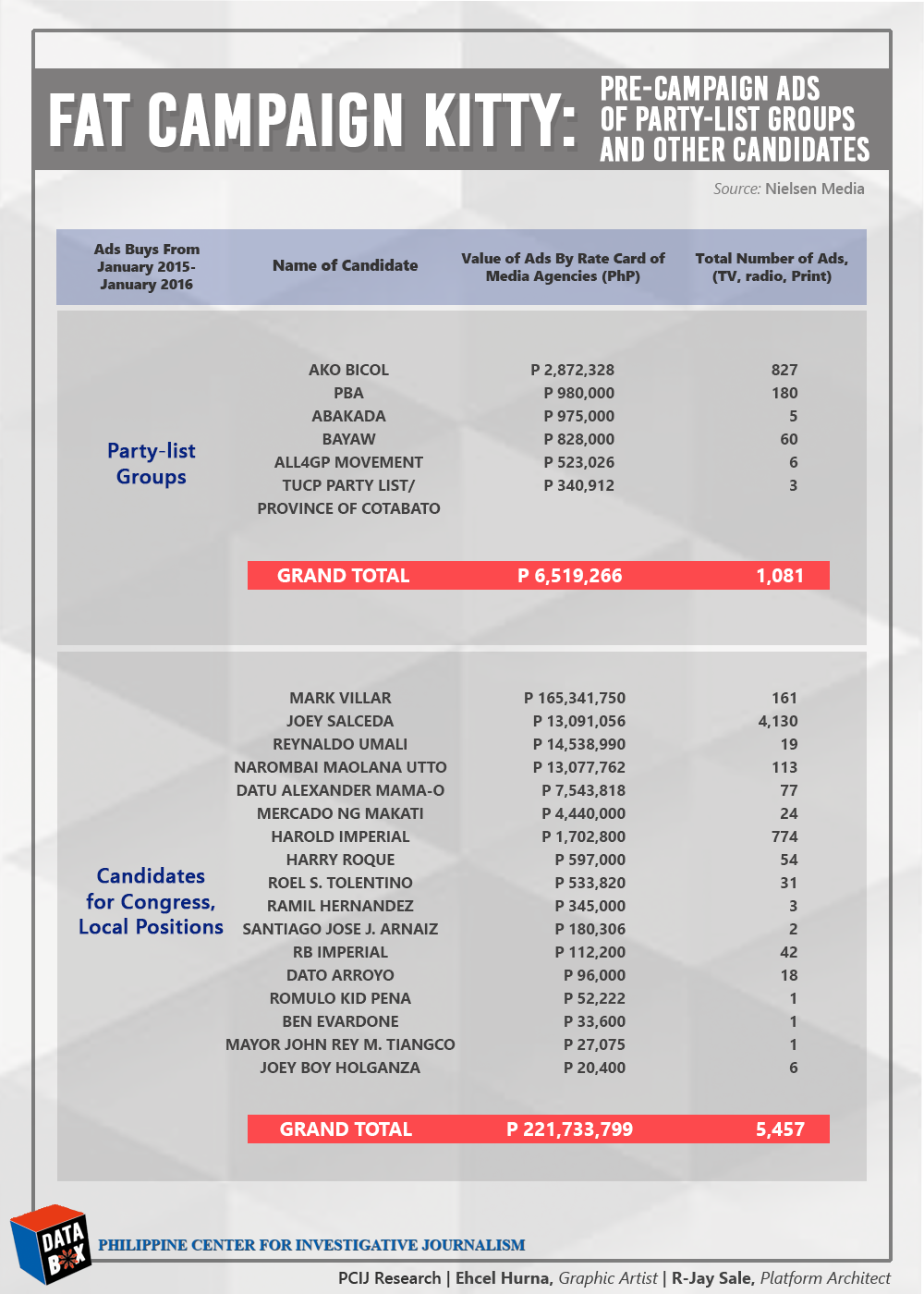
According to Nielsen Media’s monitoring reports – to which PCIJ has subscribed – a total of 108,573 “social concerns" ads worth P7.75 billion, by the media agencies’ rate cards, were aired and published from Jan. 1, 2015 to Jan. 31, 2016.
Of this, about 105,000 ads valued at P6.7 billion or 86.4% featured apparent candidates in the May 2016 elections as “advertiser” or “product” from March 2015 to January 2016.
About 90% of these pre-campaign ads aired on the top-rating TV news and teleserye programs during prime-time hours (5 p.m. to 10 p.m.), and on popular talk-news programs on national and regional radio networks. The balance ran in national newspapers and magazines.
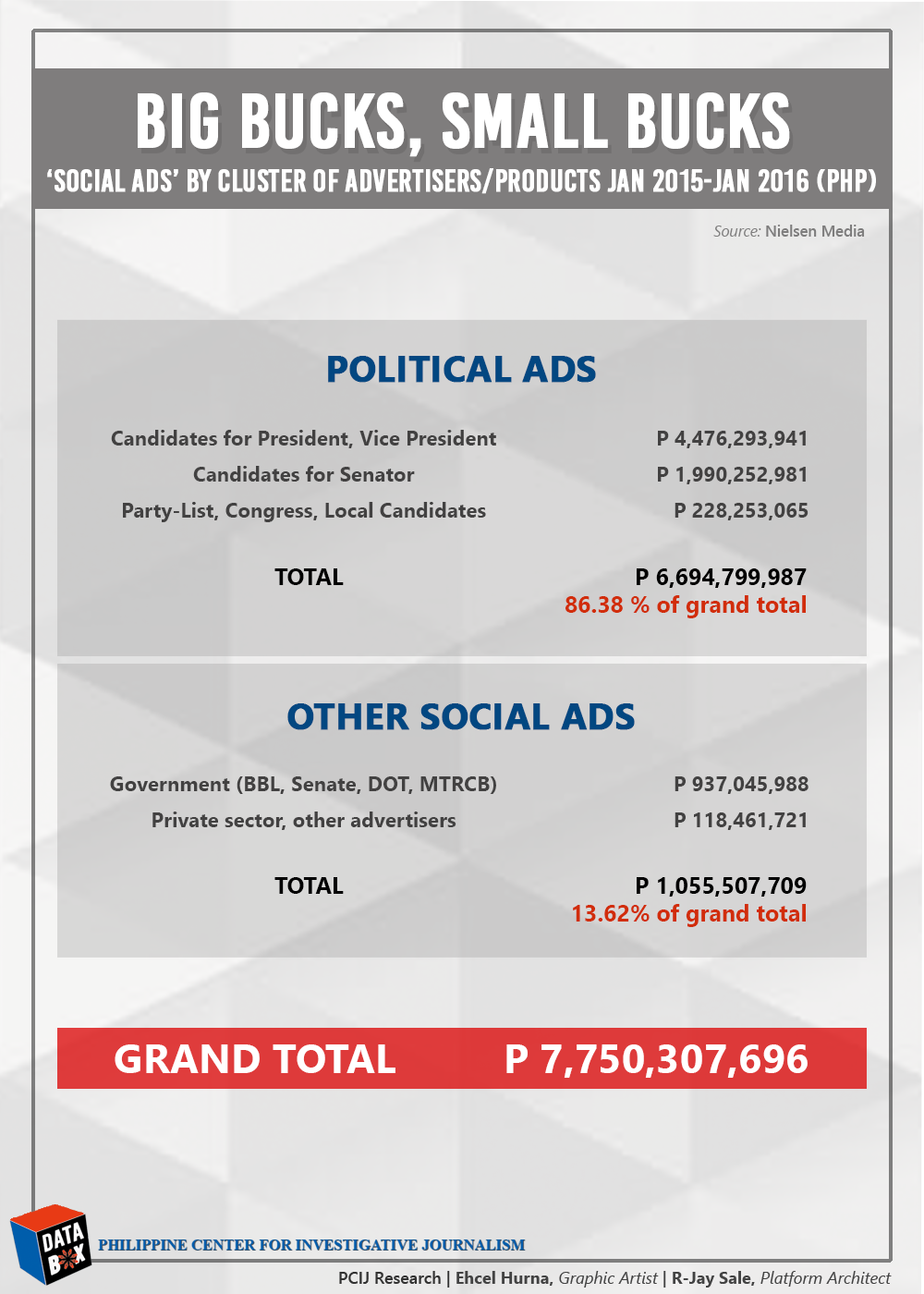
The amount of money spent on campaign advertising not only indicates the overflowing coffers of many candidates and parties, but also their willful abuse of a system that imposes caps on campaign spending and airtime limits only during the campaign period.
Impunity marks, too, the stubborn secrecy of most candidates about who paid for, or from which sources they got money for the ads. Prodded by reporters to reveal more facts, the candidates have a uniform curt reply: Donations from unnamed donors paid for their ads.
According to law, the official 90-day campaign period began only last February 9. This is even though those running in the upcoming polls became official candidates from when they filed their certificates of candidacy in October 2015.
Efforts by the Commission on Elections (Comelec) to amend the law so it could start the meter running on candidates’ spending much earlier have been repeatedly foiled in Congress.
Regulators on lookout
Yet while candidates in the May 2016 polls may get free pass from still porous election laws for their pre-campaign ads, they may have a hard time escaping from the legal and administrative liabilities that they and their donors may face, by the text and letter of anti-graft, civil service, and tax laws.
By reason and logic, the billions of pesos they have spent on pre-campaign ads could have come only from three sources: their own money, their yet unnamed donors, or public funds and purses.
By the data enrolled in their 2014 or latest SALN filing, many of the candidates who had already run up millions of pesos in ad bills before Feb. 9 have neither sufficient net worth nor cash on hand or in bank to be able to finance their pre-campaign ads.
Laws do not sleep or lie in wait during election campaigns, and in the view of four regulatory agencies – Comelec, the Bureau of Internal Revenue (BIR), the Securities and Exchange Commission (SEC), and the Office of the Ombudsman – these candidates and their donors have some serious explaining to do.
Indirect bribery
Comelec Commissioner Christian Robert S. Lim, head of the poll body’s Campaign Finance Office (CFO), notes, for instance, that anti-graft laws prohibit public officials from accepting or receiving gifts in cash or in kind from private sources, as well as from using their public office for private gain. Many of those running for office are incumbents.
“You are free (to get donations) only in so far as election laws,” Lim says, “but whether appointive or elective positions, you’re going to face complications because indirect bribery may come in (during the pre-campaign period).”
“You are a public official, you’re accepting (donations) while technically you’re not yet a candidate,” he says, “but at the same time you are still a public official.”
Donations by the billions or even just millions of pesos are not exactly moderate sums. Comments Lim: “If you look at the civil-service rules, gift-giving should be moderate. But if it is reaching millions of pesos worth, that’s a different story. There could be a violation of civil service rules, as well as the anti-graft rules.”
The Anti-Graft and Corrupt Practices Act (Republic Act 3019) states that the act of “receiving any gift… includes the act of accepting directly or indirectly a gift from a person other than a member of the public officer's immediate family, on behalf of himself or of any member of his family or relative within the fourth civil degree, either by consanguinity or affinity, even on the occasion of a family celebration or national festivity like Christmas, if the value of the gift is under the circumstances manifestly excessive.”
In its Section 3, the law said that the “corrupt practices of public officers” elective and appointive officials include:
- “Directly or indirectly requesting or receiving any gift, present, share,%age, or benefit, for himself or for any other person, in connection with any contract or transaction between the Government and any other part, wherein the public officer in his official capacity has to intervene under the law” and
- “Directly or indirectly requesting or receiving any gift, present or other pecuniary or material benefit, for himself or for another, from any person for whom the public officer, in any manner or capacity, has secured or obtained, or will secure or obtain, any Government permit or license, in consideration for the help given or to be given.”
Donor’s tax: 30 percent
Collecting taxes on donations, meanwhile, is what BIR Commissioner Kim Jacinto Henares tells PCIJ she would be interested to do.
The National Internal Revenue Code imposes a 30-percent tax on donations from stranger to stranger (in this case, the donors and the candidates), that must be remitted to the bureau within 60 days of the receipt of donation. Failing this, surcharges and penalties of up to 20% per year will apply, says Henares.
“The presumption is around one-third of that (donation) is paid in taxes,” she says, adding that candidates had better be advised that “kung hindi naman ho iyan galing sa inyo, may nag-donate ho, iyong donation na hong iyan, kasi hindi pa ho kampanya, hindi pa ho siya tax-exempt. So dapat ho nagbabayad ho tayo ng donor's tax. Thirty% ho iyong donor's tax to strangers (if the money isn’t from your own pockets, if it was donated, that donation, because it’s not yet the campaign period, is not yet tax-exempt. So we have to pay the donor’s tax. Donor’s tax to strangers is 30%).”
Henares also says she will be keeping watch over mass-media agencies, notably the television networks, to check their remittance of the commensurate value-added tax collected from pre-campaign ad buys.
“The direct implication to the media,” says the BIR chief, is “we expect them to report a six-billion-peso revenue from all these ads.”
Section 99 of the National Internal Revenue Code of the Philippines (Republic Act 8424) states that, “when the donee or beneficiary is stranger, the tax payable by the donor shall be thirty% (30%) of the net gifts.”
The Code defines a "stranger" to be a person who is not a:
- “Brother, sister (whether by whole or half-blood), spouse, ancestor and lineal descendant; or
- “Relative by consanguinity in the collateral line within the fourth degree of relationship.”
Henares says she plans to check the BIR’s files to see if the donors of funds that the candidates spent on pre-campaign ads have yielded any payments of the donor’s tax from any parties at all in the last few months.
If no such tax has been remitted yet, Henares warns that the surcharges that apply on late payment of taxes are “if there is no fraud, 25%, plus 20-percent interest per annum.”
Firms may not donate
The SEC, for its part, has issued a legal opinion in July 2015 in which it explicitly banned all corporations from donating to candidates and political parties.
SEC Opinion 15-08 dated July 27, 2015, states: “…Section 36(9) of the Corporation Code imposes an absolute prohibition for corporations, both foreign and domestic, from giving political donations, to any political party, candidate, or for the purpose of any partisan political activity.”
As for the Office of the Ombudsman, its senior officials say they are keen to monitor and review how the candidates have sourced money for their political ads, especially in light of the wealth they have declared in their respective statements of assets, liabilities, and net worth or SALN.
The “unknown” donors
For sure, some candidates have said that they have no idea on who have donated to their campaign - the better, they say, to shield themselves from favor-seeking donors. And yet indications are that the candidates and their finance and campaign managers know not only who their donors are, but also how their ad agents paid for the ads.
For one, ads are booked and paid for clients -- in this case the candidates - by the ad placement agencies that the former have hired. The TV networks have uniform rules for these deals: It’s PBB or “pay before broadcast” or the ads will not run, and pay in cash or direct deposit of payment to the networks’ bank accounts.
RELATED: Early birds on a binge: 15 top bets splurge P373M on ABS-CBN ads
For another, some ad agents now working with several candidates have told PCIJ that because they booked the ads, they pay for these direct to the networks, after getting the required cash payment from either the candidates’ finance manager, campaign manager, or communication team manager. They do not, the ad agents say, deal with the candidates’ donors at all.
“For fund requests, we take it up during the meetings with the candidate and the campaign team,” says one ad agent. “A week after, they tell us, ‘Go do it, book it,” and you get it right away – cash.”
Ads are also more than just about the networks’ rate cards, points out the agent. An equally big but hidden cost that candidates incur goes to producing the ad materials that could run on TV. Ad-material production, in turn, normally has candidates sitting through concept and storyboard discussions, attending shoots, talking or acting before the cameras, and then reviewing and approving the ads for broadcast.
It is industry practice for ad agents with established contractual relations with networks to get a 10- to 15-percent commission on ad placements they book.
Concludes the agent: “The candidate would have to know - certainly knows - about the ads.”
LP bets’ ads: P1.99 billion
Some candidates and political parties, of course, may have to explain more than others regarding their pre-campaign ad spends.
Topping Nielsen’s reports on pre-campaign ad spenders is the Liberal Party pair of former Interior and Local Government Secretary Manuel ‘Mar’ Roxas II (P969,173,267) and Camarines Sur Rep. Maria Leonor ‘Leni’ Robredo (P273,856,544), who also had tandem ads worth P92,326,469. Together, their combined total ad buys as of Jan. 31, 2016 come up to P1,335,356,280.
Roxas's ads started running in August 2015. For January 2016 alone, his ad spend was P291,145,762, including P234,961,626 for TV ads and P56,184,136 for radio ads.
Robredo's ads first hit the airwaves only in November 2015. In January 2016 alone, she incurred P89,810,523 in ad spend, including P89,457,723 for TV ads and P352,800 for radio ads.
The duo’s total ad spots of 22,542 consisted of 20,159 for Roxas, 540 featuring both of them, and 1,843 for Robredo – in all cases mostly aired on TV.
Apart from the ad spend of Roxas and Robredo, eight of the 12 candidates for senator of the Liberal Party had also incurred a combined total of P659,991,074 of political ads.
In all, the administration party led by President Benigno S. Aquino III and its national candidates had already invested a grand total of nearly P2 billion –P1,995,347,354, or a third of the P6.69 billion spent on political ads for the period.
A billion for Binay, Poe
The LP bets are followed by the United Nationalist Alliance (UNA) candidates Vice President Jejomar Binay and Sen. Gregorio Honasan, who have a combined total ad spend of P1,144,345,760. The bulk of this sum went to promoting Binay’s run for the presidency, P1,050,065,095. By contrast, their tandem ads cost only a total of P64,607,324, while Honasan’s solo ads ran up a bill of P29,673,341.
Binay's ads started airing in June 2015; in January 2016 alone, he placed ads worth P347,470,186, including P14,760,488 for radio ad spots.
Total ad spots for Binay, Binay/Honasan, and Honasan came up to 9,071. It included 8,781 solo ads for Binay, 177 for the Binay-Honasan tandem, and only 113 solo ads for Honasan.
Also in the Billion-Peso Ad Club is the Galing at Puso slate of Senators Grace Poe and Francis ‘Chiz’ Escudero, which incurred total ad spend of P1,019,190,923. Interestingly, only a sliver or P2,776,800 of that amount covered Escudero’s solo ads.
For this ad spend, Poe acquired total ad spots of 24,971 mostly on TV and radio, and Escudero, 618, mostly on radio.
Poe's ads started airing in August 2015. In January 2016 alone, she acquired ads worth P274,120,425, including P207,012,211 for TV ads, and P67,074,614 for radio ads.
Other candidates
A fourth tandem, Davao City Mayor Rodrigo Duterte (PDP-Laban) and Sen. Alan Peter Cayetano (Nacionalista Party) ranked fourth in the list of ad spenders. Their ad spend came up to P715,943,742, broken down as follows: P146,351,131 for Duterte; P419,002,456 for Cayetano; P62,630,621 for them both; P87,885,089 about Cayetano and wife Taguig City Mayor Lani Cayetano; and P74,445 for the PDP-Laban.
The pair acquired a combined total of 2,157 ad spots, including 1,533 that featured Duterte alone.
Duterte’s first ad came out in March 2015 but it stopped airing for a few months later, or while he remained unsure about running for president. When he finally decided to run in December 2015, Duterte’s ads picked up speed again before Christmas. In January 2016 alone, he placed TV ads valued at P10,105,180.
Cayetano, in contrast, acquired a total of 421 TV ad spots for himself, and another 98 ad spots featuring him with his wife Lani, starting April 2015. He stopped airing ads in January 2016 though.
Independent candidate for vice president Sen. Antonio Trillanes IV was featured in pre-campaign ads worth P8,953,380, according to Nielsen. His total ad spots: 984.
The People’s Reform Party’s Sen. Miriam Defensor Santiago distinguished herself as the only candidate for president who did not air or publish any pre-campaign advertisement. Her running mate, Sen. Ferdinand ‘Bongbong’ Marcos Jr. of the Nacionalista Party, however, bought ads by the bucket.
Marcos’s ad buys began in June 2015. It had reached P252,503,856 in value as of Jan. 31, 2016, according to Nielsen Media. It paid for 4,199 ad spots on TV, radio, and print.
Send in the stars
But some candidates for the country’s top two posts also invested in creative – and costly – means to gain exposure. Among them is the Liberal Party’s demure vice-presidential bet Robredo, whose life story was featured last February 6 on the top-rating “Maalaala Mo Kaya” program of ABS-CBN Entertainment. Young star Dimples Romana played Robredo's part, and actor Marvin Agustin, that of Robredo's late husband Jesse.
Two candidates for president have also invaded entertainment TV, or tapped entertainment stars to up their appeal to voters.
Duterte guested on ABS-CBN's “Gandang Gabi Vice” variety show on Dec. 7, 2015.
Roxas, meanwhile, had a dramatized interview with teen heartthrob Daniel Padilla in a video that was first posted on YouTube on Nov. 6, 2015. As of this writing, it has drawn less than 9,000 views and about 200 mostly critical comments.
In addition, Roxas and Robredo starred in the "Fast Forward" MTV of an all-star cast of actors from the ABS-CBN and GMA7 networks. Posted on YouTube on Dec. 5, 2015, it has drawn about 740,000 views.
Media agents say such cameo roles or guest appearance for the candidates on entertainment TV can be had only for a hefty price. In fact, they say, the cost of these special promotional packages is equivalent to at least four to five minutes of ad placements, or about P4 million to P5 million. A minute-long ad on prime-time TV goes for at least P900,000.
As a norm, the candidate's team will also have to cover the talent fees and other production cost of the actors and the program's staff.
The network's sales teams and a candidate's media agents typically initiate such bundled deals. Often, a candidate's team could prescribe their terms on the program staff during their "story conference." Says a media agent: "They choose the actors who will play the candidate's part, the location, dress, and color that should be in the program, and define the script."
Wannabe senators, too
In the meantime, many wanna-be’s for Senate seats bought millions of pesos of pre-campaign ads as well.
From the Liberal Party’s senatorial slate, the eight candidates who incurred a combined total of P659,952,074 on pre-campaign political ads, as of Jan. 31, 2016 were:
- Joel Villanueva, P168,302,116
- Leila de Lima, P132,522,526
- Panfilo ‘Ping’ Lacson, P119,722,666
- Jericho Icot Petilla, P111,895,689
- Teofisto Guingona III, P67,957,814
- Risa Hontiveros, P50,658,681
- Ralph Recto, P8,892,582
- Franklin Drilon, P39,000
Guingona, Recto, and Drilon are re-electionist senators, and Lacson, a returning senator. Three others are appointees of President Benigno S. Aquino III -- De Lima, former justice secretary; Petilla, former energy secretary; and Villanueva, former director-general of the Technical Education and Skills Development Authority. Hontiveros was former Akbayan party-list representative.
Martin’s millions
Fourteen candidates for senator from the other political parties also spent a total of P1.33 billion on pre-campaign ads during the period.
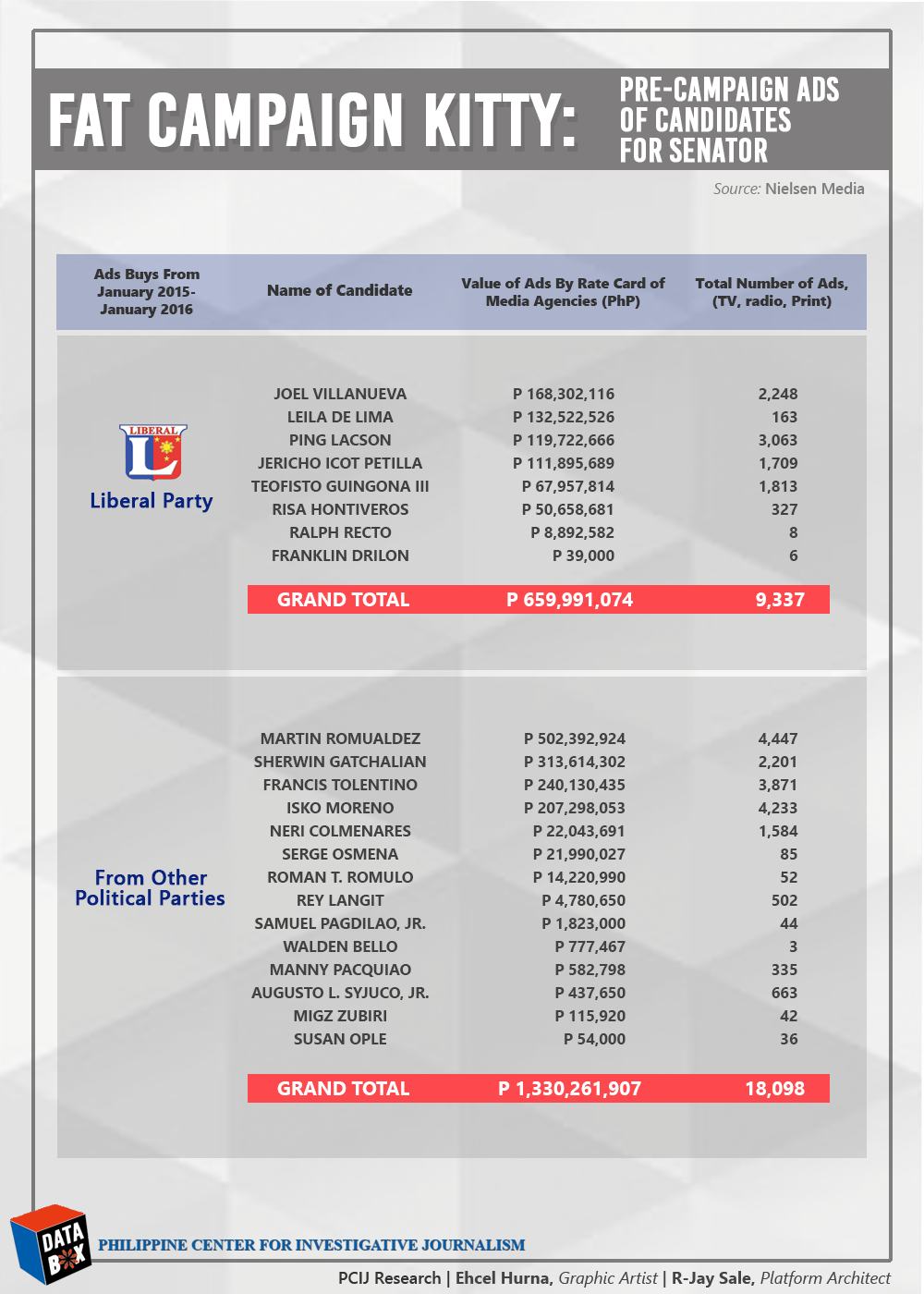
Topping the list is Bongbong Marcos’s cousin, Leyte's 1st District Rep. Ferdinand Martin Romualdez who acquired twice more ads than the former, P502,392,924, from August 2015 to January 2016. He is serving his third and last term in Congress.
Next to Romualdez’s half-a-billion-peso ad buys are a few more big spenders, and a lot of smaller spenders. They are:
- Sherwin Gatchalian, P313,614,302
- Francis Tolentino, P240,130,435
- Isko Moreno, P207,298,053
- Neri Colmenares, P22,043,691
- Serge Osmena, P21,990,027
- Roman T. Romulo, P14,220,990
- Rey Langit, P4,780,650
- Samuel Pagdilao Jr., P1,823,000
- Walden Bello, P777,467
- Manny Pacquiao, P582,798
- Augusto l. Syjuco Jr., P437,650
- Juan Miguel ‘Migz’ Zubiri, P115,920
- Susan Ople, P54,000
Gatchalian, Romulo and Pacquiao are district representatives, while Bello and Colmenares are party-list representatives in the 16th Congress. Osmena is a re-electionist senator, Zubiri a former senator, and Tolentino, recently resigned chairman of the Metropolitan Manila Development Authority. Moreno is serving his third and last term as vice mayor of Manila.
Too little for BBL
As a group, these candidates for national office accounted for P6.69 billion or 86.38% of the P7.75 billion in total “social concerns" ads purchased from TV, radio, and print media agencies, from January 2015 to January 31, 2016.
The remaining balance of P1.05 billion represents ads about “social concerns" by state agencies and the private sector, including a puny P14,747,950 that went to promoting the Bangsamoro Basic Law or BBL (The Aquino administration's supposedly landmark reform legislation would be finally lost to chronic absenteeism in the House of Representatives and testy debates in the Senate.)
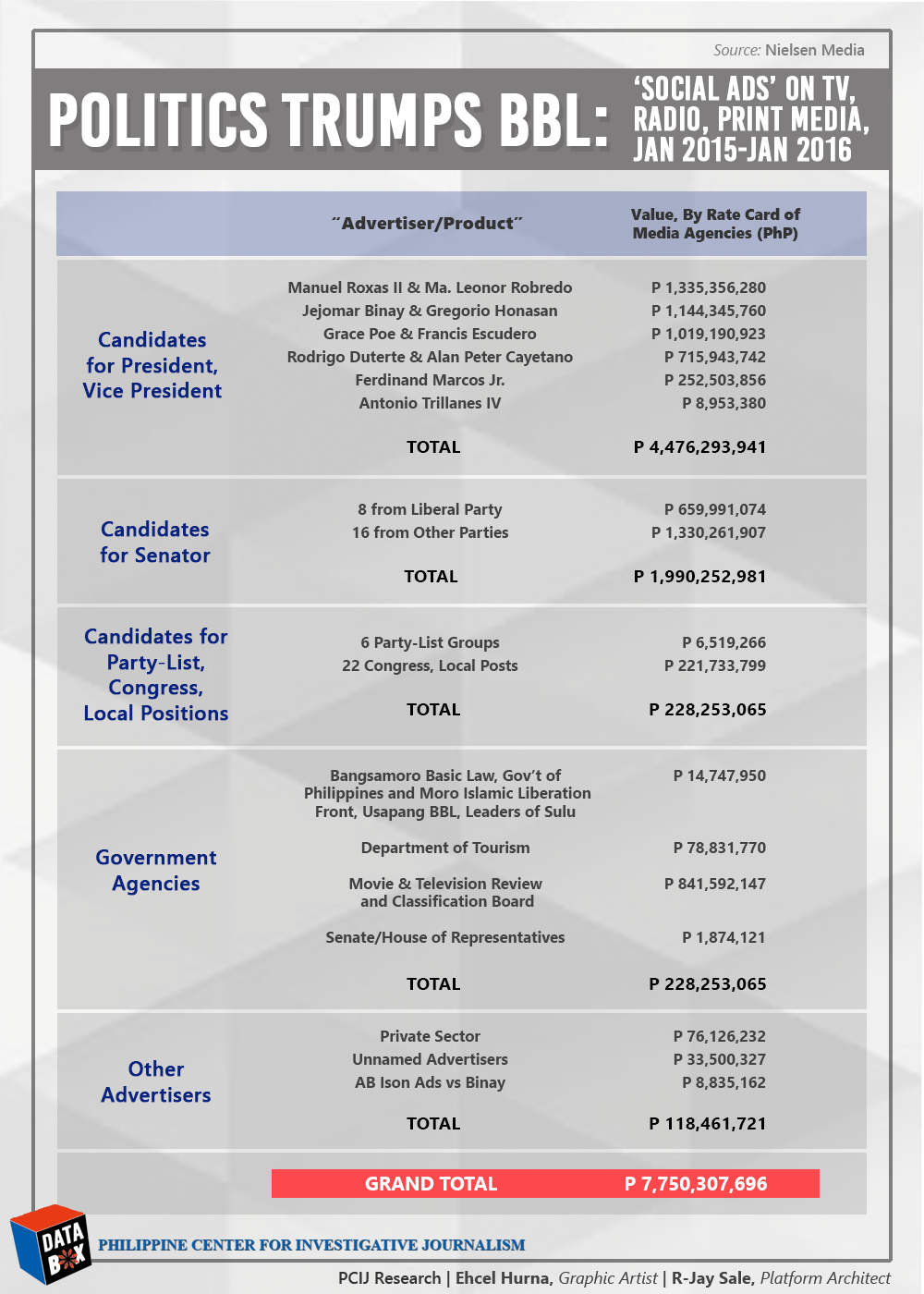
This figure even came from various advertisers, including a joint ad series of the Government of the Philippines and the Moro Islamic Liberation Front worth P6.48 million for the BBL throughout 2015, as well as the local officials and leaders of Sulu, and the Usapang BBL group.
By comparison, the Department of Tourism incurred a total ad spend of P76.83 million in 2015 for its “It’s More Fun in the Philippines” campaign. The amount is 11 times more than the government’s ad spend for BBL last year. - with research and reporting by Vino Lucero, Davinci Maru and Earl Parreno, PCIJ, March 2016
- Latest
- Trending














